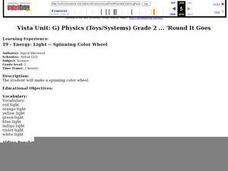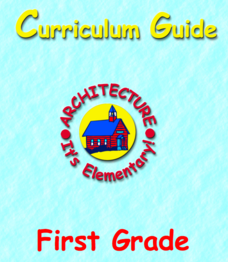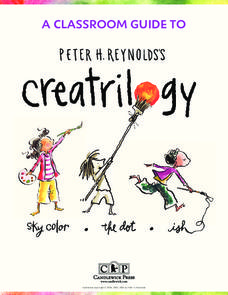Scholastic
Study Jams! Light
Let there be light in your classroom with a video that explains that light travels in waves, the electromagnetic spectrum contains seven colors, and the color of an object depends on which light waves it reflects and absorbs. With...
Curated OER
Energy: Light -- Spinning Color Wheel
Second graders make spinning color wheels to determine how energy effects what colors look like. They paint or color a color wheel with the seven colors of the spectrum. Next, the spin the wheel to determine what happens. In order to...
Curated OER
Solar System Vocabulary
In this solar system vocabulary skills activity, students match the 13 solar system-related names and terms in the word bank to the appropriate definitions.
Curated OER
Dinosaur Vocabulary 2
In this dinosaur vocabulary skills worksheet, students match the 11 listed dinosaur-related terms to the appropriate sentences that describe each of them.
California Academy of Science
Colorful Fish Adaptations
I love lessons that incorporate the arts, they're so engaging and address a more diverse set of learners. Your class will investigate the reasons fish from the coal reef have adapted such colorful fins. They design a fish that uses color...
Scholastic
Study Jams! Heredity
Mia wishes her blue hair was inherited so that she wouldn't have to dye it, but Sam explains that eye color is. The video does not expound upon the concept of alleles. It does, however, describe inherited traits vs. learned behavior, and...
Scholastic
Study Jams! Properties of Matter
Does matter really matter? Properties of matter are discussed by Sam and RJ: mass, volume, and density. They differentiate between mass and weight. They explain how to measure these properties. Make sure to teach your class about other...
American Museum of Natural History
What's This? Colorful Creatures
An online resource shows learners some species that are very good at using their camouflage as well as other ways species use their coloring for survival. Interactive and digital, the lesson is perfect as a remote learning resource.
SF Environment
Sort and Color!
Sorting is a very important skill that can be used in math and even science. Learners get familiar with some environmentally friendly vocabulary terms as they practice separating objects that can be recycled from those that can't. They...
Scholastic
Study Jams! Light Absorption, Reflection, & Refraction
Zoe and RJ are trying to photograph an egret on a lake, but they are having trouble with the lighting. Reflection, refraction, and absorption are explored through their thoughtful dialogue so that your physical scientists are illuminated...
Curated OER
Things That Glow
Third graders study the concept of light as an energy source. In this energy lesson students participate in a lab that show them the concept of light as an energy source.
Curated OER
Environmental Issues Vocabulary and Speaking Exercise
Eight color graphics fill the top half of this page. Each of them is meant to represent a different environmental topic: poaching, deforestation, pollution, etc. Youngsters associate vocabulary terms with each graphic and then answer...
National Nanotechnology Infrastructure Network
Synthesis and Characterization of CdSe Quantum Dots
Does the size of a sample change the physical properties of that substance? It turns out it can! Young scientists combine physics and chemistry to synthesize CdSe quantum dots and record their color properties. Learners should...
American Institute of Architects
Architecture: It's Elementary!—First Grade
Build an interest and appreciation for architecture in your young learners with this fun 10-lesson art unit. Engaging children in using their five senses, the class first observes the environment around them, paying...
NASA
The Types of Clouds and What They Mean
Learn to forecast the weather using cloud types. Budding meteorologists identify cloud types and learn to use a dichotomous key. As scholars develop observation and identification skills, they discover how different cloud types cause...
Serendip
Molecular Biology Vocabulary Review Game
Getting bored with the typical review strategies? Why not turn it into a game! Learners practice their DNA vocabulary by trying to get their partner to guess the word they're describing. To complicate things a bit, there are words that...
Science Friday
Colorful Chromosomes
Everything is in the genes. Individuals observe 14 different traits of themselves. Using pipe cleaners and beads, the learners create models of a chromosome representing their traits. The class then compares and contrasts everyone's...
Curriculum Corner
Coniferous and Deciduous Trees
What are the differences between coniferous and deciduous trees? Supplement your tree lessons with a set of activities that has learners describing, naming, comparing, and reading about deciduous and coniferous trees. The activities are...
Howard Hughes Medical Institute
Mapping Genes to Traits in Dogs Using SNPs
Genetic analysis has gone to the dogs! Learners use real DNA information collected from dog saliva to study the relationship between genotypes and phenotypes. They analyze alleles to determine correlations to coat color, length, and...
Core Knowledge Foundation
Taking Care of the Earth Tell It Again!™ Read-Aloud Anthology
A read-aloud anthology closely examines human impact on the Earth while boosting reading comprehension skills. Through stories, scholars examine the concepts of natural resources, pollution, garbage, and recycling and brainstorm...
American Museum of Natural History
See the Light
It's time to see the light! Scholars perform three different experiments with light to reveal properties using a great remote learning resource. The pupils see how light reflects from a surface and refracts through different materials....
Candlewick Press
A Classroom Guide to Peter H. Reynolds's Creatrilogy
Help young readers find, identify, and use their voices with a set of empowering activities based on Peter H. Reynolds' trilogy of books. Sky Color, Ish, and The Dot focus on recognizing moods and treating each other...
Curated OER
Lesson Plan Outline for Rainbow Science
Young scientists study light reflection and refraction as they determine the critical angle, the rainbow angle, and color separation in rainbows. Teams record the data they collect in a shared spreadsheet and discuss results with the class.
Smithsonian Institution
Expedition: Insects
Get up close and personal with beautiful and sometimes dangerous insects in an exciting eBook activity! Pupils practice geography skills by reading a map with the location of six different insects. Scientists read about each insect,...





















